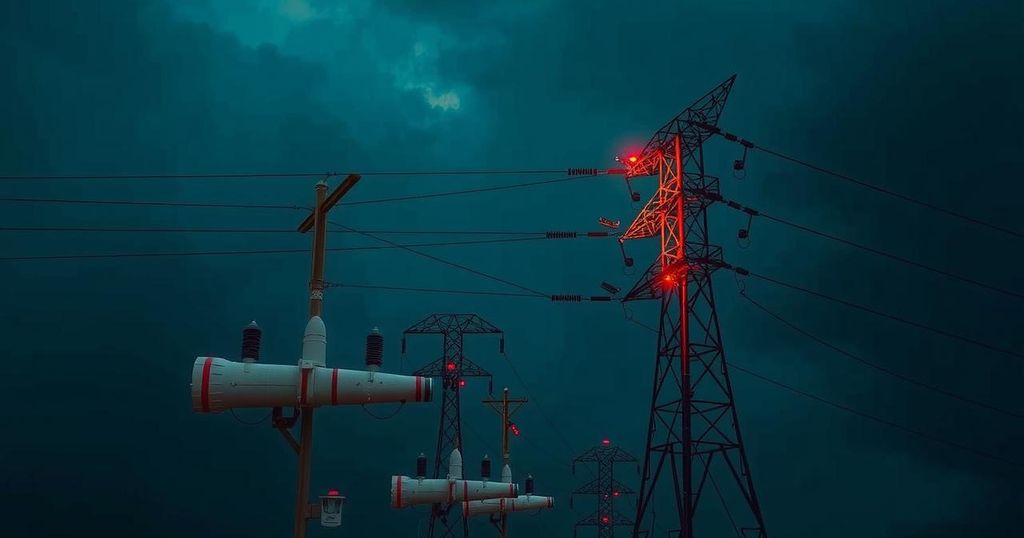Cuba Faces Widespread Blackouts Following Hurricane Rafael’s Fury

Hurricane Rafael has left the entire island of Cuba without power for the second time in two weeks, destroying crops and damaging infrastructure. The storm impacted vulnerable regions including Havana and crucial agricultural provinces. Despite governmental mobilization efforts, residents express concern over inadequate recovery and long-term resource shortages, reflecting broader issues within Cuba’s aging infrastructure and socio-economic conditions.
Cuba is grappling with widespread power outages for the second time within two weeks, following the impact of Hurricane Rafael. This Category 3 hurricane traversed the western agricultural regions of the island, unleashing destructive winds that toppled trees and power lines while further damaging crops. Reports indicate limited information regarding the storm’s aftermath, as Rafael diminished in strength after entering the Gulf of Mexico, according to the United States National Hurricane Center. In Havana, residents cautiously ventured into the streets to assess the impact of the storm. Fortunately, rainfall was minimal, yet the region’s infrastructure, including its aging housing, remains a point of concern, particularly for the 10 million inhabitants who are susceptible to severe weather events. The provinces of Artemisa and Pinar del Río, known for their robust tobacco production, were particularly affected, leading to a precautionary measure where farmers safeguarded approximately 8,000 tons of tobacco leaves. In response to Rafael’s destruction, authorities suspended flights at Havana’s Jose Marti International Airport, as well as at the beach resort of Varadero. Many educational institutions and businesses were closed, and transportation services gradually resumed. President Miguel Diaz-Canel’s administration mobilized military resources to facilitate recovery efforts, emphasizing their historic resilience in overcoming such challenges. However, sentiments of despair permeated through the populace, stemming from a lack of assurance regarding the government’s capacity to deliver vital resources amidst financial and infrastructural constraints. Community members such as Marta Leon Castro expressed dire circumstances, while others like Giovanny Fardales lamented the impending spoilage of food due to the prolonged power outage. Just weeks prior, a similar outage occurred, exacerbated by inadequacies within the country’s energy sector, resulting in significant loss of life and property during Hurricane Oscar. Hurricane Rafael marks the 17th named storm for the current hurricane season, which is anticipated to see a surge in activity in the coming years. The National Oceanic and Atmospheric Administration has forecasted an exceptionally active 2024 hurricane season, characterizing significant threats to not only Cuba but the broader Caribbean region as well, given the increase in frequency and intensity of storms in recent years.
Cuba is often vulnerable to hurricanes due to its geographical location and the condition of its infrastructure. The island has faced numerous storms, which have typically resulted in widespread power outages and significant damage to crops and housing. The challenges are compounded by an aging energy system reliant on oil-fired power stations, which have previously failed to withstand the impact of drastic weather conditions. The socio-economic implications of these storms are significant, especially in light of the current political challenges and economic sanctions affecting the country.
Cuba’s experience with Hurricane Rafael exemplifies the ongoing vulnerabilities the nation faces due to its geographic and infrastructural challenges. With the devastation of crops, such as tobacco, and widespread power outages, the storm underlines an urgent need for resilient systems against future hurricanes. The sentiments of despair and uncertainty among the Cuban populace reflect deeper issues related to governmental responses and resource availability in times of crisis, particularly given the predictions of more active hurricane seasons ahead.
Original Source: www.aljazeera.com






